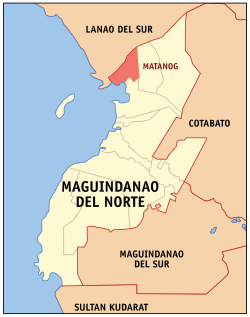Top Qs
Timeline
Chat
Perspective
Matanog
Municipality in Maguindanao del Norte, Philippines From Wikipedia, the free encyclopedia
Remove ads
Matanog, officially the Municipality of Matanog (Iranun and Mëranaw: Ingëd a Matanog; Maguindanaon: Inged nu Matanog; Filipino: Bayan ng Matanog; Arabic: بلدية ماتانوج), is a municipality in the province of Maguindanao del Norte, Philippines. According to the 2020 census, it has a population of 36,034 people.[5]
Remove ads
History
Summarize
Perspective
Establishment and early years
Matanog was established by virtue of Presidential Decree No. 780, signed by President Ferdinand Marcos on August 25, 1975, when six barangays of Parang in what was then Maguindanao were separated. The seat of government was designated at Barangay Langkong.[6]
Matanog is among the municipalities inhabited mainly by the Iranun people, along with Buldon and Barira;[7] much parts of these had constituted the Camp Abubakar, the main camp of the Moro National Liberation Front (MILF) since the 1980s.[7][8] The local government units had held office either in Cotabato City or in Parang since the Marcos presidency, with the municipal halls in Matanog and Buldon being almost vacant.[7]
Narciso Ramos Highway (Parang–Malabang Road), connecting the present-day provinces of Maguindanao del Norte and Lanao del Sur and was completed on April 15, 1996, was later extended to Langkong junction which became the access road leading to the rebel camp.[8]
2000 battles
Matanog was among those municipalities where series of battles occurred, leading to the camp's fall in 2000. Part of the Narciso Ramos Highway in the municipality was heavily fortified; as being the gateway to the camp, became easy for government armor assets to access. During the military's Operation Dominance from April 29 to June 3, MILF installations in eight barangays were captured; 63 soldiers and some 424 rebels were killed.[8]
Post-battle
The recovery of the municipality following the war of 2000 became difficult due to political rivalry that caused rido between the two factions, Imam and Macapeges–Lidasan clans,[9] one of the region's well-known disputes.[10][11] The feud began when Nasser Imam defeated incumbent mayor Kahir Macapeges in 2001, with the election results being disputed.[11] It worsened armed hostilities among political clans, especially in 2002;[7][9] and left nine relatives and two others dead.[10][11] In what would be the largest settlement,[10] the families formally reconciled in Davao City on January 30, 2008.[11][12]
The town was part of the province of Shariff Kabunsuan from October 2006 until its nullification by the Supreme Court in July 2008.
Remove ads
Geography
Barangays

Matanog is politically subdivided into 8 barangays. Each barangay consists of puroks while some have sitios.
- Bayanga Norte
- Bayanga Sur
- Bugasan Norte
- Bugasan Sur (Poblacion)
- Kidama
- Sapad
- Langco
- Langkong
Climate
Remove ads
Demographics
Economy
Poverty Incidence of Matanog
10
20
30
40
50
60
70
80
2000
79.94 2003
65.04 2006
52.50 2009
43.68 2012
59.32 2015
55.88 2018
64.66 2021
51.39 Source: Philippine Statistics Authority[18][19][20][21][22][23][24][25] |
- Gross Domestic Product
The Gross Domestic Product of the Municipality (2022) is 9,128,700,000(PHP).
References
External links
Wikiwand - on
Seamless Wikipedia browsing. On steroids.
Remove ads





